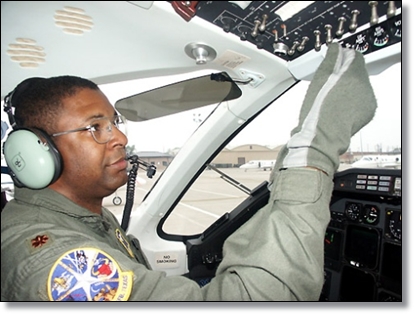Pilots' Psychological State: A Review

 |
| A pilot in a cockpit Photo courtesy |
Sometimes strict logic and nerves of steel are overcome by emotions, fear or even rage and pilot behaviour becomes highly unpredictable. However, according to AviationCV.com, these are exceptional cases as people, who are unreliable and easily overcome by emotions are ‘discarded’ during practical training. Still, the possible reasons for emotional breakdowns and inadequate on-board reactions can result from overwork or illness. It begs the question whether preventing psychological and emotional problems is still the sole responsibility of a pilot himself.
“It is practically impossible to predict whether a person will be a good pilot. The key factor when selecting candidates is their motivation. An immediate motivation can be measured; however, the long-run one, unfortunately, cannot be. A good pilot must be emotionally stable, blessed with fast reaction and a keen team player,” - says the CEO of AviationCV.com S.Knyzaite.
The airmen themselves tend to keep the concerns about their psychological vulnerabilities private as they fear appearing weak and losing their jobs. In the meantime, airlines pay much more attention to aircraft technical state and pilot qualifications whilst ignoring the issue of emotional stability. S.Knyzaite maintains that it is a very important factor that must be addressed when considering the actual abilities of any candidate pilot. The pilot himself must also be able to assess his own psychological readiness.
Prior to operating flights, pilots must undergo a number of complex psychological testing. The IQ of candidates also very important and must be no lower than 95. In the meantime, the general health of pilots is checked before entering aviation studies. An airman must be healthy. The airman must not be prone to conditions that could result in sudden health problems and diminished abilities during a flight. All health checks are performed by specially trained medical staff in accordance with the JAR FCL 3 standards (Joint Aviation Requirements - Flight Crew Licensing, Part 3, Medical) applicable across the entire Europe. However, although psychological examination is optional, the aforementioned standards indicate that if an aviation practitioner or a psychiatrist has any suspicions regarding the pilot’s emotional state or behaviour, he must receive a psychological consultation. Candidates applying to training institutions and choosing aircraft pilot studies must also pass a professional aptitude test that addresses spatial awareness, memory, team-work skills as well as personal characteristics.
According to the psychiatrist and aviation medicine specialist Darius Ereminas, sometimes candidates must be rejected due to being supreme introverts who are incapable or, in some cases, even unwilling to work in a team. “As in the history of evolution a human being has not learnt to fly, pilots must know the specifics of human functioning and physiologic peculiarities in the air as well as the psychology of working within a team,” explained D.Ereminas.
Courtesy: AviationCV.com:Part of aviation business group - Avia Solutions Group.
